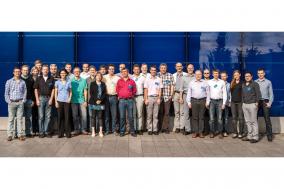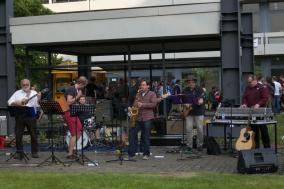Our students' scientific work
A key element of the training we provide is related to the research work carried out by our students. At the beginning of this reporting period this consisted of project work, students' research reports and diploma theses. Today, this work consists of semester projects, bachelor's and master's theses. These research projects which students work on play a central role in our education. The student projects are closely linked to larger scale research projects which often carried out in collaboration with partners both from all over Germany and abroad.
The preparation of these research projects, implementation and monitoring by providing guidance and entering into discussion, their integration into ongoing projects, their classification between the poles of prospects of success and risk experience are essential elements of forward-looking teaching. Providing support for our students' work is an essential part of the daily routine at our Chair. Our advanced students are given the opportunity to experience at first hand the interaction between the stages of experimental design, the experiment itself, data acquisition, evaluation, interpretation and modelling.
The associated supervision is not always straightforward and cannot be automated due to the nature of the work involved. It requires a good deal of dialogue between learned members of staff and the students and also requires a high degree of organizational preparation. To a large extent, the final "masterpiece" of a bachelor's or master's thesis, is still very much what distinguishes a course of study as the badge of an education enjoyed at a research university. It is important that students are given the opportunity to gain experience beyond Germany's borders and are able to confidently present their results in English. The ultimate goal of our efforts is to endow our students with the ability to use their own initiative to solve problems independently and to make a habit of thinking creatively.
Both the Bachelor and the Master's degrees are recognised today as professional qualifications. It goes without saying that the same set of skills that were once acquired in a five-year diploma course of studies can now only be developed in a two stage bachelor's / master's program. A three, or three and a half year Bachelor's course cannot provide the level of qualification which has made our German diploma engineers known throughout the world, an indispensable body of talent for us as a nation of exporters.
The Master's degree in Materials Engineering opens the door to excellent opportunities in various fields in industry. For example, materials manufacturers such as ThyssenKrupp and system engineering companies like Siemens and RWE are always on the lookout for candidates with materials knowledge. A career in the field of medical technology is yet another possibility. The automotive sector, the aerospace field, the energy sector... all of these are open to qualified, motivated young people. In addition, there is also a variety of interesting job opportunities to be found in small and medium enterprises.



